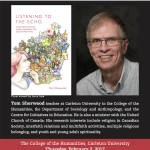“When the Gods Read What We Write” Panel — Society for the Anthropology of Religion, New Orleans
Panel Call for Papers
Society for the Anthropology of Religion
May 15-17, 2017
New Orleans, LA
Panel Co-Organizers:
Dr. Marc Roscoe Loustau
Catholics & Cultures Fellow and Visiting Lecturer
College of the Holy Cross, Worcester, MA
Dr. Hannah Hofheinz
Assistant Professor of Systematic Theology and Church History
Ecumenical Theological Seminary
Title:
“When the Gods Read What We Write: Rhythms of Reading and Writing across Theology and Anthropology”
Abstract:
We invite submissions of abstracts for a panel at the 2017 Society for the Anthropology of Religion meetings, “When the Gods Read What We Write.” This panel examines the unstable nexus between theological and anthropological practices of reading and writing. Our starting point is the investigation of what happens when scholars take divine beings seriously as subjects (and not only objects) of anthropological and theological reading and writing.
The panel’s title glances toward the 1996 edited volume When They Read What We Write: The Politics of Ethnography, but seeks to take advantage of a far-reaching insight emerging from the late 1990s self-reflexive zeitgeist in anthropology as a whole. The most important and unsettling realization that emerged from the self-reflexive turn was the relativization of the discipline’s cherished notions of ethnographer-as-subject and cultural other-as-object. Where the phenomenon of non-anthropologists reading anthropological texts once served to explode ethnographic notions subjectivity and objectivity, we seek to ask what similar startling consequences might arise when the gods read what anthropologists and theologians write.
At stake when scholars encounter divine beings as subjects are a number of potentially challenging questions, and we invite papers that address them both critically and reflectively: What are reading and writing in theology and anthropology? How do our understandings of these practices change when humans and divine beings engage in them alongside each other? Do human and divine beings read and write within the same temporal frameworks or using the same rhythms? How do particular mediations of divine presence shape the time and tempo of the divine acts of reading and writing? What limits to knowledge and understanding are undermined or reinforced when humans and divine beings read and write together? What notions of intersubjective relationship and community become visible or recognizable when the gods read what anthropologists write?
Topics for papers might include (but are not limited to): liberation movements and divine-human encounters in activist experience; mystical experiences; ritual and divine-human encounters, exorcism and healing; visionary and apparition events; practices of discernment in theology and anthropology; styles of reading and writing in anthropology and theology classrooms; and historical studies of clergy/missionary anthropologists.
Please send abstracts (250 words max.) of proposed papers to Dr. Marc Roscoe Loustau (mloustau706@gmail.com) and Dr. Hannah Hofheinz (HHOFHEINZ@etseminary.edu) by 1PM (EST) on Thursday, January 29th Wednesday, February 8, 2017.


